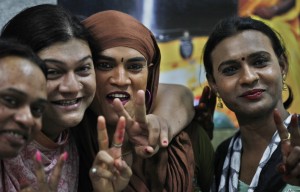TBI Blogs: Tracing the Legal Steps That Mark India’s Acceptance of Transgenders
From redrafting the Rights of Transgender Persons Bill, 2014 to including transgenders as beneficiaries in social security schemes, India is making great strides in ending discrimination of transgender persons in the country.

From redrafting the Rights of Transgender Persons Bill, 2014 to including transgenders as beneficiaries in social security schemes, India is making great strides in ending discrimination of transgender persons in the country.
Over the last few years, there have been important developments for eliminating the historic discrimination and exclusion of transgender persons; and for ensuring that they are accepted in society and given equal opportunities and access to resources. In April 2014, the Supreme Court of India gave a major boost to transgender rights in India in by its decision in the landmark case National Legal Services Authority v. Union of India. It recognised the right of transgender persons to adopt their self-identified gender as male, female or ‘third gender.’ The case spurred many executive actions and policy changes to further the rights of transgender persons.
Two very recent developments that could prove to be major steps forward for the rights of transgender persons are: (i) redrafting of the Rights of Transgender Persons Bill, 2014 and, (ii) extension of social security schemes by the Odisha Government to transgender persons.
These steps are important for ensuring that transgender persons are accepted within the fold of society and have access to the same resources and opportunities as other members of the society.

Redrafting of the Rights of Transgender Persons Bill
The Rights of Transgender Persons Bill, 2014 was passed by the Rajya Sabha in April 2015. The Bill manifests many aspects of the Supreme Court’s judgment such as social welfare measures for transgender persons and measures to raise awareness on issues of transgender rights.
Recently, a committee of the Ministry of Social Justice and Empowerment cleared the Bill after including a chapter that defines various atrocities and violence against transgender people as offences.
Some of the offences included in the newly-added chapter include: (i) forcibly removing the clothes of a transgender person, and parading them naked; (ii) making transgender persons commit forced or bonded labour; (iii) enticing a transgender person to beg; (iv) forcibly dispossessing a transgender person from his/her house, village or other place of residence; (v) intentionally insulting or intimidating with the intent to humiliate a transgender person in a public place; (vi) denying them access to a place of public resort; and (vii) committing any act derogatory to human dignity.
Many of these acts constitute offences under the existing criminal law as well. True impact of the redrafted Bill can be assessed after the text is made available to public.
The redrafted Bill is important to ensure that the many horrifying acts responsible for the social exclusion of transgender persons are stopped. Ill-treatment of transgender persons is a social evil that needs to be tackled effectively by law as well as by creating awareness.
The Bill also provides for constitution of a National Council for Transgender Persons to advise Central and State governments on issues relating to the rights of transgender persons.
However, there is a lack of sufficient political will in the Government and Lok Sabha to pass the Bill. There is also a concern that the final law may be a diluted version of the draft Bill.
Passing of the Bill into law is important to implement the transgender rights that have been recognised by the Supreme Court.

Photo Courtesy: Raj K Raj
Odisha Government extends social security schemes to transgender persons
Historical marginalisation of transgender persons has left them with lack of access to the resources and opportunities that other members of society enjoy. Due to discrimination, transgender persons were not allowed access to the same education facilities, employment opportunities and other resources we enjoy. In order to obliterate this, the Supreme Court of India had directed governments to frame social welfare schemes for the betterment of transgender persons. This is an important step to ensure that transgender persons can assimilate in society without compromising on their identity.
In July 2015, Odisha took a major leap forward in this direction by creating the Department of Social Security and Empowerment of Persons with Disabilities (SSEPD). This Department will handle matters related to the rights of transgender persons. The SSEPD has drafted a proposal for recognition of transgenders in Odisha and for providing them with certificates that identify them as third gender.
The SSEPD will implement five sub-schemes, sponsored by the Central Government, for the welfare of transgender persons. As part of the scheme, transgender students will get pre-matric and post-matric scholarships. Transgender persons will be provided assistance with skill development training. Other sub-schemes include provision of assistance to parents of transgender children and national pension scheme for transgender persons (full details here).
In September 2015, the Odisha government took steps to extend the benefits of the National Food Security Act, 2013 to transgender persons (notification available here). Further, the Odisha government recently announced that transgender persons would be provided with the same social welfare benefits as people below the poverty line under various schemes.
While the Supreme Court judgment allows transgender persons to self-identify as ‘third gender’ or as male or female, these schemes list transgenders who identify as ‘third gender’, as beneficiaries. These schemes should also extend to transgender persons who identify as male or female. The implementation of the schemes will give greater clarity on the manner of identification of beneficiaries.
These initiatives are important steps forward to remedy the exclusion faced by transgender persons and to improve their socio-economic standing.
The policies will improve access to employment and education opportunities for transgender persons. Social welfare measures will let transgender persons live with dignity.

The legal developments relating to the rights of transgender persons have led to the emergence of many stories that showcase greater inclusion and acceptance of transgender persons in the society. Transgender persons need no longer hide their identity. In fact, many are breaking barriers to emerge as leaders of their fields. For example, the Karnataka government recently honoured a transgender rights activist with the Rajyotsava award. The first Indian transgender band and transgender modeling agency have been well received on social media. Transgender persons are occupying various public posts such as polling booth officer, public officer, college principal and sub-inspector. The legal developments will give transgender persons the space to build the life they desire for themselves. They will no longer need to hide their identity to be a part of society. They will be able to pursue their education, get jobs and participate as equal citizens. This is an important step for building an inclusive, accessible and diverse India.
This article is authored by Swati Agrawal, Associate Director (IDIA).
Featured image source: Wikipedia
Like this story? Or have something to share? Write to us: [email protected], or connect with us on Facebook and Twitter (@thebetterindia).
This story made me
- 97
- 121
- 89
- 167
Tell Us More
We bring stories straight from the heart of India, to inspire millions and create a wave of impact. Our positive movement is growing bigger everyday, and we would love for you to join it.
Please contribute whatever you can, every little penny helps our team in bringing you more stories that support dreams and spread hope.



















